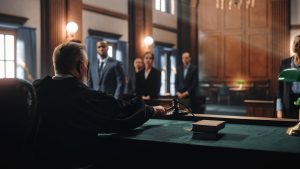Oklahoma Bar Journal
Trial & Error
By Dylan D. Erwin
Somehow, and as nonsensical as it may seem, I knew I wanted to be a trial attorney before I even knew I wanted to be an attorney. A noble and vociferous trial attorney, standing before a jury of my client’s peers, arguing with impassioned and nuanced language in favor of my case. Reaching such poetic and rhetorical heights that I seemed to float across the courtroom rather than walk. I’m not unique in this desire. Many of my ilk during our law school education shared the same dreams – reveling in the Atticus Finch of it all. Little did I know, expectation and reality rarely find common ground.

Gorodenkoff | #462414911 | stock.adobe.com
A few years ago, there was a series of features in the Oklahoma County Bar Association publication, the Briefcase, in which seasoned trial attorneys recounted their earliest trial experience. Not only were the articles informative, but many of them were equal parts hilarious and cringe-inducing. Hilarious because – as Mark Twain allegedly said – humor is tragedy plus time; cringe-inducing because well, to err is to human – and we’re all human. Reading those articles made me think about my first trial experience. They made me think about whether my first experience was one of “The Incredible Floating Trial Lawyer” or something more akin to the articles I read in the Briefcase. I’ll let you be the judge.
The year was 2014. My license to practice law was still warm from the printer. I was a 26-year-old prosecutor. It was a perfect day outside. The sun was shining, but the heat, distracted by a soft breeze, wasn’t oppressive. It was the day of my first trial – a non-jury trial on a misdemeanor DUI charge – and even the weather seemed to be on my side. Even though it was a non-jury trial, I still gave an opening statement. Why not? After all, I was a trial lawyer. That’s what trial lawyers do. The defense attorney waived her opening statement. It threw me off, but I quickly recovered. I called my first and only witness. The police officer who stopped my client and performed the standard field sobriety test. I didn’t even need my notes. I knew the case inside out. The defense barely even cross-examined the officer. When the judge asked if I had any redirect, I smiled and said, “No, your honor” and sat back down. He excused my witness and asked me to call my next one. I didn’t have one. I didn’t need one. So, after a stellar opening and a seamless, off-the-cuff direct examination, I announced my rest.
Then something happened. Defense counsel was smiling. Defense counsel stood up. Defense counsel said the words that would haunt me for years to come.
“The State of Oklahoma has failed to establish that the crimes alleged were perpetrated by my client, and that the crimes alleged took place within the confines of Comanche County, Oklahoma.”
had forgotten to ask the officer to identify the defendant. I had forgotten to establish venue. While the realization began to sink in, I heard a voice from the other end of the courtroom. It was the judge.
“Demurrer sustained. Case dismissed.”
And just like that, my first trial was over. I had lost. I didn’t even have the wherewithal to crash and burn. I had fizzled out like a wet firecracker. The noble and vociferous trial attorney I imagined I was seemed to have taken the day off. Probably to enjoy the nice weather. I left the courtroom disappointed, confused and feeling the emotional equivalent of having had a sprig of parsley in my teeth and no one to tell me.
Eight years have passed since that first trial, but the lessons I learned are as fresh today as they were then. No matter how prepared I am, you will never find me in court without notes. No matter how confident I am, you will never find me grandstanding. No matter how convinced I am that I’ll remember to bring up every element of every claim, I won’t sit down until I’ve placed little checkmarks beside each element on a printed OUJI.
This is what I’ve come to learn about expectation vs. reality, in law as well as in life. Reality is nothing more than expectation tempered by experience – or, in my case, purified in a (non-jury) trial by fire. While we may not immediately be what we set out to be in this profession, each success and misstep gets us closer to that ideal. As young lawyers, it’s imperative that we keep that idea in mind. In his Meditations, Marcus Aurelius tells himself, “What stands in the way becomes the way.” As you navigate the uncertain and oft-choppy waters of a budding legal career, never forget that every step – even every misstep – leads you closer to the lawyer you always wanted to be.
And with that, I rest.

Mr. Erwin practices in Oklahoma City and serves as the YLD chairperson. He may be contacted at derwin@holladaychilton.com. Keep up with the YLD at www.facebook.com/obayld.
Oklahoma Bar Journal – OBJ 93 Vol 3 (March 2022)
